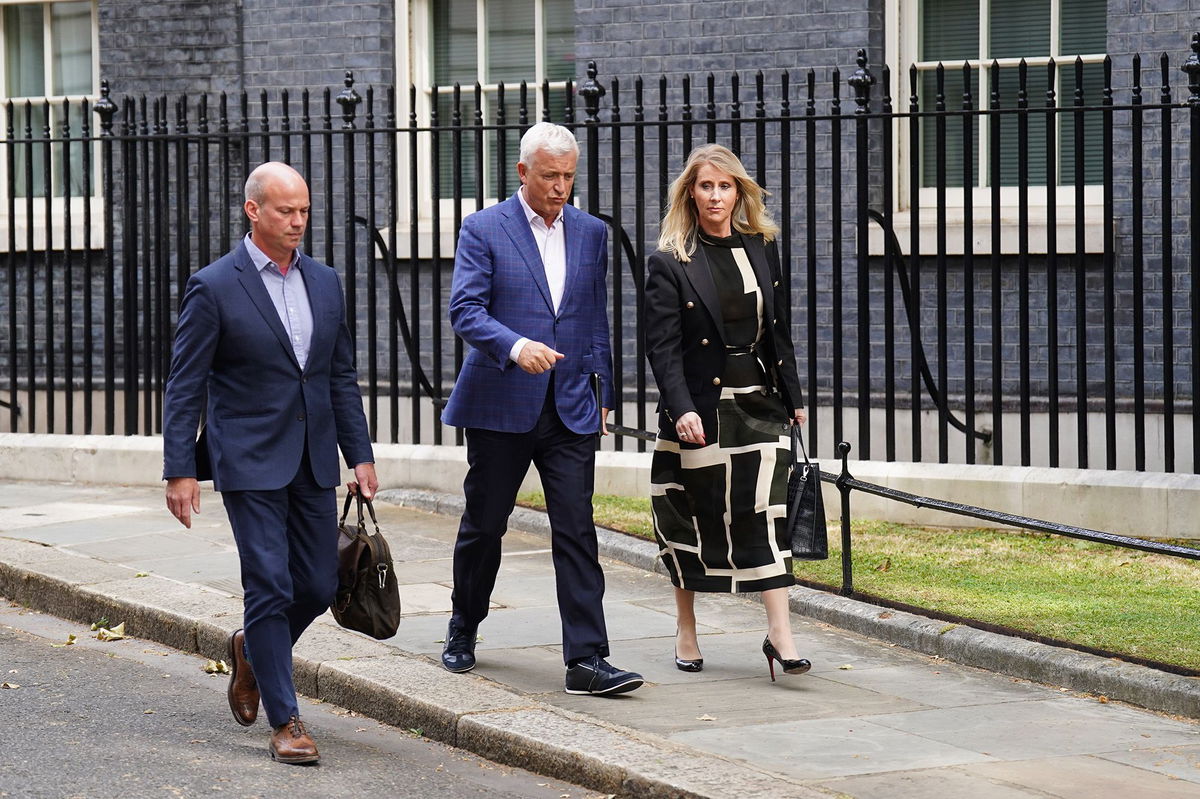Britain is facing a mortgage crisis. There are no easy answers

Matt Hammerstein
By Anna Cooban, CNN
London (CNN) — The UK government and the country’s biggest banks met Friday in a bid to defuse a looming mortgage crisis that threatens hardship for millions and represents a huge political headache for Prime Minister Rishi Sunak.
The lenders — which account for more than three-quarters of the UK mortgage market — have agreed, among other measures, to give borrowers who default on their mortgages a 12-month grace period before repossessing their homes, the UK Treasury announced.
As interest rates soar toward levels not seen in more than 20 years, borrowers will also be able to reduce their monthly payments — for example, by extending the term of the loan — without that affecting their credit scores.
Jeremy Hunt, the UK finance minister, said in a statement the “measures should offer comfort to those who are anxious about high interest rates and support for those who do get into difficulty.”
The meeting was attended by the chief executives of the country’s biggest lenders, including HSBC (HSBC), Lloyds Banking Group (LYG) and Barclays (BCS).
Sarah Coles, head of personal finance at Hargreaves Lansdown, an investment services provider, told CNN that the measures were a “step forward” but still came at a cost for borrowers.
“If you extend the period of the mortgage, you will be paying interest for longer — so it will cost less each month but more in total,” she said.
Mortgage pain
The announcement comes a day after the Bank of England raised interest rates by half a percentage point to help bring down stubborn inflation. That was the 13th hike in the cost of borrowing for commercial banks since December 2021. It now stands at 5%, the highest level since April 2008, and could end the year at 6% — a two-decade high.
More than 2 million UK mortgage holders paying a fixed interest rate are facing an increase of hundreds of pounds in monthly repayments when they are forced to refinance this year and next.
So much so that more than a million households — or about 4% of all households in the country — are likely to see their savings wiped out by the end of the year by higher mortgage bills, according to estimates by the National Institute of Economic and Social Research.
“The rise in repayments on top of existing impacts from the cost-of-living crisis will likely push hundreds of thousands of households over the edge of insolvency,” Max Mosley, an economist at NIESR, said in the briefing note released Thursday.
Jake Berry, a lawmaker from the ruling Conservative Party, pressed the government Tuesday about the “mortgage bomb about to go off.”
Sunak is caught in a bind. He has promised to halve inflation and get the economy growing by the end of the year. To achieve the first goal, he needs the Bank of England to keep hiking interest rates. But rocketing mortgage bills could tip the UK economy into a recession as homeowners cut back spending in other areas.
Other than encouraging lenders to relax their repayment terms, the government has few options. It has ruled out offering subsidies or tax breaks to affected mortgage holders, saying that would fuel inflation — which could lead to even higher interest rates, compounding the problem.
Many borrowers bought their homes when mortgage rates were closer to 1% or 2%.
But, this week, the interest on the average two-year fixed-rate mortgage rose above 6%, according to financial product comparison website Moneyfacts.
That’s the highest since the start of December when the mortgage market was still feeling the impact of the disastrous “mini” budget conceived by former Prime Minister Liz Truss.
If mortgage rates remain at that level, households will spend almost £280 ($356) more on their mortgage each month on average, compared with what they were paying in March 2022, according to the Institute for Fiscal Studies. Those aged 30-39 will pay nearly £360 ($458) more.
Brexit partly to blame?
Consumer price inflation in the United Kingdom remained stuck at 8.7% in May, defying forecasts that it would tick down. Core inflation, which excludes volatile food and energy costs, rose to hit a 31-year high of 7.1%.
That sets the country apart from other major economies, including the United States, where on both measures inflation has started to ease.
Seven years to the day since the UK narrowly voted to leave the European Union, some former Bank of England policymakers blame Brexit for the divergence.
Former central bank Governor Mark Carney told The Daily Telegraph newspaper last week that Brexit was a “unique aspect” of the UK economy that helped explain why its inflation remained so high.
“We laid out in advance of Brexit that [it would create] a negative supply shock for a period of time and the consequence of that will be a weaker pound, higher inflation and weaker growth,” he said.
Then, on Thursday, a former deputy governor at the central bank, Charlie Bean, told BBC Radio 4 that Brexit had made it much harder for UK companies to hire workers at short notice from abroad.
Britain has a “tighter” labor market than its European peers, he said, which was putting upward pressure on wages and, as a result, fueling inflation.
After the latest rise in interest rates Thursday, Hunt said the government would “stick to [its] guns” on keeping rates high to tame high prices.
“Our resolve to do this is watertight because it is the only long-term way to relieve pressure on families with mortgages. If we don’t act now, it will be worse later.”
— Hanna Ziady contributed reporting.
The-CNN-Wire
™ & © 2023 Cable News Network, Inc., a Warner Bros. Discovery Company. All rights reserved.